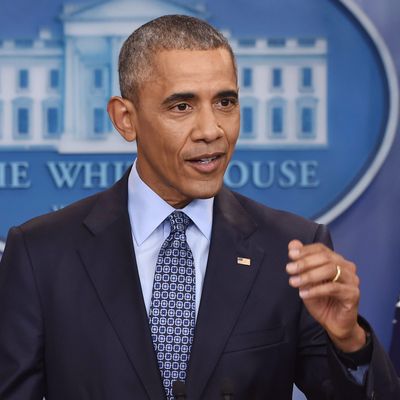
Barack Obama will not leave behind a proud legacy on press freedom. His administration has brought more prosecutions against whistle-blowers and leakers than all its predecessors combined. His Justice Department has spied on reporters and attempted to compel the New York Times’ James Risen to divulge his confidential sources via the threat of imprisonment.
In two days, Donald Trump will inherit these precedents.
But in his final press conference Wednesday, the president drew attention to the other, more Fourth Estate–friendly precedents he will bestow on his successor.
Obama addressed reporters in the close confines of the White House briefing room — a location aides selected over the more spacious State Dining Room, so as to symbolically affirm the press’s right to be in immediate proximity to those in power. That right had recently come into question, as Esquire reported that Donald Trump’s team was considering moving journalists out of the West Wing, thereby limiting their opportunities to question senior staffers.
In his opening remarks, Obama made his desire to defend the press’s prerogatives against his successor’s whims explicit.
“You’re not supposed to be sycophants — you’re supposed to be skeptics,” Obama said. “And having you in this building has helped this place work better.”
The president suggested that the media’s persistent scrutiny of his reaction to crises such as the 2014 Ebola outbreak and the BP oil spoil had made his administration more responsive to the needs of the public.
“So America needs you, and our democracy needs you,” the president said.
Obama went on to say that, while he plans to take a break from politics, he would not hesitate to enter the fray if our democracy’s other needs were in jeopardy.
“There’s a difference between that normal functioning of politics and certain issues or certain moments where I think our core values may be at stake,” the president said. “I put in that category if I saw systematic discrimination being ratified in some fashion. I put in that category explicit or functional obstacles to people being able to vote, to exercise their franchise. I put in that category institutional efforts to silence dissent or the press. And for me at least, I would put in that category efforts to round up kids who have grown up here and for all practical purposes are American kids and send them somewhere else, when they love this country.”
The president spent much of his last press conference defending his administration’s final decisions. Responding to criticisms of his commutation of Chelsea Manning’s 35-year sentence for leaking classified documents, Obama said, “First of all, let’s be clear … Chelsea Manning has served a tough prison sentence. So the notion that the average person who was thinking about disclosing vital classified information would think that it goes unpunished, I don’t think would get that impression from the sentence that Chelsea Manning has served.”
Defending his decision to allow the United Nations to condemn the expansion of Israeli settlements, the president argued that the two-state solution is the only acceptable resolution to the Israeli-Palestine conflict — and ongoing settlement expansion is “creating a reality on the ground that increasingly will make a two-state solution impossible.”
Obama conceded that the president-elect’s nominee for ambassador to Israel has a very different view, and that Trump has the “prerogative” to take policy in the Middle East — or anywhere else — in a new direction.
“It is appropriate for him to go forward with his vision and his values,” Obama said of his successor. “And I don’t expect that there’s going to be enormous overlap.”
But to the extent that Trump’s vision and values involve ratifying “systemic discrimination,” or violating the freedom of the press, or undermining the security of undocumented children, the president suggested that he would not hesitate to speak out.
And his voice remains a resonant one. The latest Washington Post-ABC News poll puts Obama’s approval rating at 60 percent — 20 points lower than it was just before his inauguration in 2008, and 20 points higher than Trump’s is today.






























